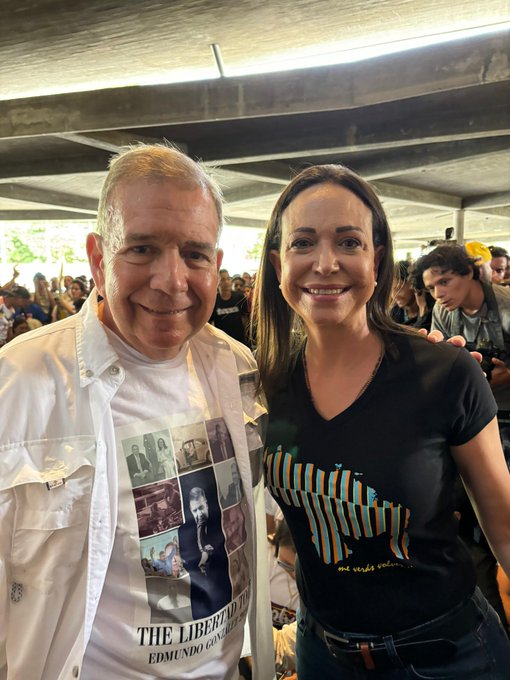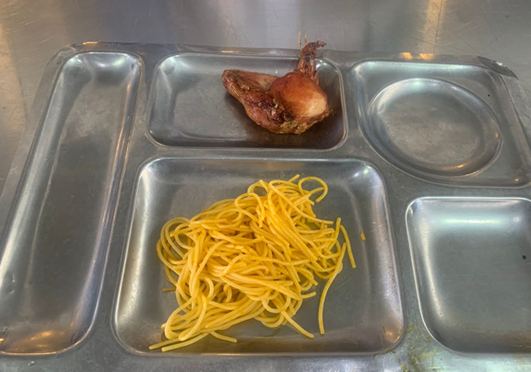The Battle for the Heart of the UCV
An alleged ban on an opposition event is the latest chapter in the long fight for control of the oldest university in Venezuela


On Sunday, María Corina Machado and Edmundo González Urrutia –wearing a t-shirt alluding to Taylor Swift that proclaimed the “Libertad World Tour”– addressed hundreds of young people gathered in the Plaza Cubierta at Caracas’ Ciudad Universitaria, as part of an event organized by Jóvenes por Venezuela – a political youth group that includes members of the Federation of University Centers (FCU) of the Central University of Venezuela. “You were born and raised in tyranny, but you are going to celebrate freedom,” Machado told the students. Meanwhile, two documents circulated on social media in which the rector of the UCV –the anthropologist Víctor Rago, elected in July 2023– rejected the act in that space. In a document, for technical reasons. In another, for political reasons.
The discussion on social media went off right away. In addition to the usual anti-Corinista consultants and pundits, several figures who have supported González Urrutia criticized the event: “I want the UCV to be respected,” said former lawmaker and former minister Hiram Gaviria. “Not everything goes, there are ethical limits in politics, as in life,” said Ramón Guillermo Aveledo, former secretary of the MUD. Others rejected the ban: former lawmaker José Guerra, who has been critical of Machado in the past, cited a Hugo Chávez event on campus in 1995. Historian Elías Pino Iturrieta, for his part, said the new authorities were “deepening” a “worrying stage of decline” for the university.
A day later, the University debunked the document that rejected the act for political reasons.
A fake document and a real document
The authenticity of one of the two documents illustrates the political frictions around a decision that is formally technical. In the days prior to the event, given the information that began to circulate on social media, Rector Rago sent some voice notes –quickly disseminated– to university professors. There, Rago explained that he had met with the president of the FCU and about twenty young party activists from the university to discuss the request of the students for permission to do the event. According to Rago, the Security Directorates and the Preservation and Development Council of the University later determined that the space was not “appropriate” and that the use of open spaces was not “recommended” but rather of auditoriums, as had previously been done with the candidate.
“The organizers are going to organize the event, even at the beginning they had said in a threatening tone that they were going to organize it with or without authorization,” Rago said in another voice note. However, Rago explained that now no stage or chairs would be installed in the Plaza Cubierta. “I don’t know if they are reliable because the invitation they did does not allow us to control attendance,” Rago said. “We are not opposed to the act being carried out, but rather that it is carried out in accordance with the specifications that guarantee, on the one hand, safety and, on the other hand, the avoidance of property hazard.”
However, in the voice note Rago admitted that a document –not the same one that was later denied– was his and was being circulated “inappropriately” because it was not “public” but for the “applicants.” That is to say, the document in which Rago considers the use of the space “improper” and “deplores” that people were invited before permits were handed was authentic. Another document that denied the use of the Ciudad Universitaria for partisan events, addressed “to public opinion” and without signatures of the rectors, would be the falsification later rejected by the UCV.
The argument about the use of spaces was shared by those who defended Rago’s response to the organizers. “The biggest difference [with previous political events on campus] is the space where they requested permission. Edmundo González Urrutia has gone to the university four times, he has been in classrooms, auditoriums and even the Professors’ Association on two occasions and there has not been any setback, or rejection or denial,” says Nashla Báez, an anthropologist who is the Representative of Graduates in the Faculty of Economic and Social Sciences. “Fidel Castro presented a book in the Aula Magna and Hugo Chávez held an event in the Plaza del Rectorado, which is an open space where if something happens like a tear gas bomb, so common in the university’s history, and there is a stampede it is much easier to evacuate… not so in the Plaza Cubierta.”
For others, there are precedents for the use of space. “I am surprised that people are outraged by political acts at the UCV,” says Rafael Uzcátegui, human rights defender, graduate of the university and director of the Laboratorio de Paz think tank. “In the 60s, 70s, 80s and 90s, the Plazas were a platform for the leftwing. Even people kept vigil [for the death] there.”
“In the covered area, in the uncovered area, in Tierra de Nadie, political acts of all kinds were carried out for many years,” says Dick Guanique, a member of the leftist Vanguardia Popular party and who was part of leftist university groups. “But as far as I remember, there were never any electoral events within the university.” However, Guanique affirms, political repression in the campaign has reduced electoral spaces: “The university continues to be a space that allows no one to be arrested, no one to be imprisoned, because you can carry out an electoral activity without the promoters of the elections putting you in prison.” In this context, private universities have had more scope for action: the Andrés Bello Catholic University, for example, was able to organize the opposition primary debate in July 2023.
UCVLand
But the discussion about the use of the Plaza Cubierta is just one part of a series of discussions about the destiny –and the political role of the UCV– that have arisen since the election of Rago as Rector and the departure of Cecilia García Arocha, the rector who directed the UCV for 15 years –after the suspension of the university elections by the Supreme Tribunal of Justice– and who later joined Machado’s campaign and has affirmed her intentions of running for mayor of the Chacao municipality in 2025. The transition between both rectorates occurs at a time when the Presidential Commission for the Recovery of the UCV, appointed in July 2021 and chaired by Vice President Delcy Rodríguez, has entered the Ciudad Universitaria –a UNESCO World Heritage Site since 2000– to officially restore its buildings. However, the presence of the Commission has been described by critics as a violation of university autonomy.
For years, the UCV and the Chavista governments –using budget allocation to subdue the university, which is public but autonomous– faced each other in a fight for their autonomy. “The state has failed miserably with public universities, it does not the allocated budget, scholarships are almost non-existent due to how poor they are, and salaries have university professors and workers in a situation of food vulnerability,” says Báez.
“Every so often the CLAP trucks arrive to deliver food for the dining room, in the middle of cameras for propaganda,” says Uzcátegui. “However, the resources are insufficient to keep it permanently open.”
But the Commission’s “recovery” has not addressed the UCV crisis beyond its built space. According to Báez, the government –fearing losing the status given by UNESCO– initially intervened when part of the roof of the covered corridor collapsed in June 2020. “They have been installed since 2021 without anyone’s authorization,” she says.
However, she adds, “in a process of dialogue and negotiation it was agreed that they would not do anything without the supervision of the UCV Preservation and Development Council (COPRED) and they went from acting with total autonomy in the university to having an institutional counterweight that inspects everything he does.” But criticism persists. This year, for example, the FCU demanded the “delivery of spaces” by the coordination of the rectorate and the National Union of UCV Workers demanded that the powers of the commission be transferred to the university authorities.
For Uzcátegui, “although formally there are elected authorities, the territorial control of the Ciudad Universitaria belongs to the so-called ‘UCV Presidential Commission’ that acts under the logic of occupation.” The Commission, for example, has painted the logo of the Ministry of the Interior and Justice on the playing fields. “Now you need permission from the Heritage Commission to paste a sad photocopy on a wall at the UCV. Even on billboards,” he says. “They turned the UCV into a theme park.”
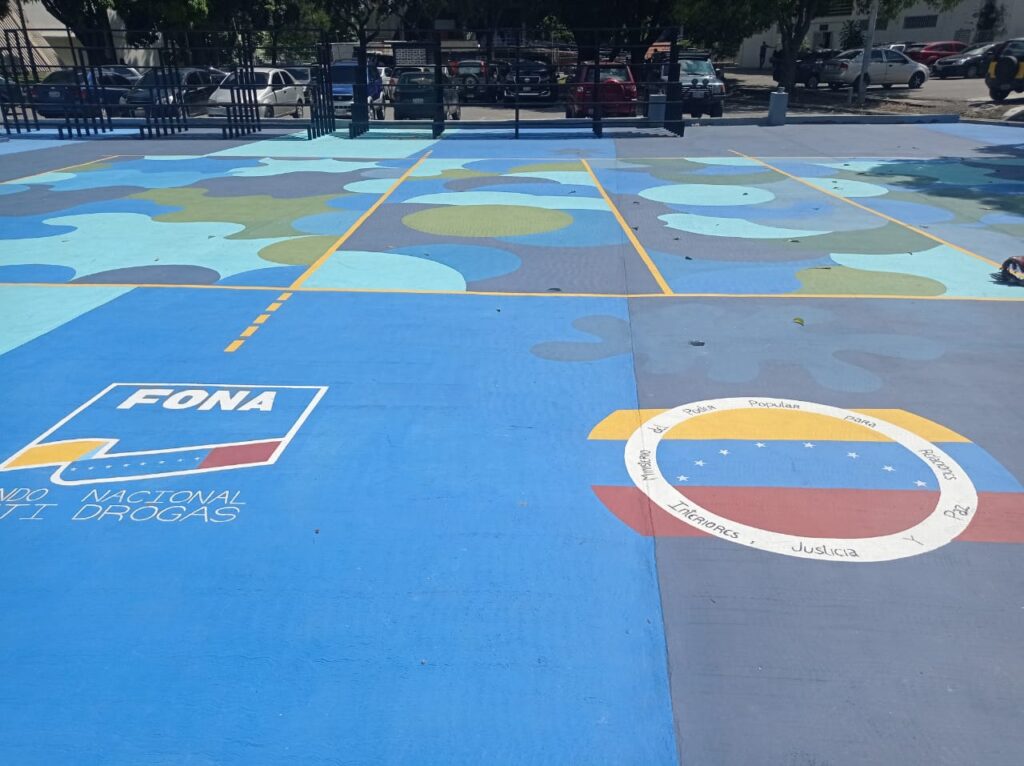
“There has been an attempt to intervene in a series of university functions and this is clearly an element of violation of autonomy, such as the assignment of surveillance, maintenance, and cleaning teams within the university,” says physicist Humberto Rojas, who competed for the rectorship against Rago. “Even some of the contractors have tried to intervene or act in areas that have to do with academic development within the university.”
The Commission, furthermore, has not limited itself to remodeling. In January, Luis Millán, from the Coordination of the Rectorate, sent a communication to all departments of the University indicating that the institutional letters should incorporate the heading “2024. Year of curricular transformation at the UCV.” “It is a model of cohabitation imposed on a House defeated by the Shadow,” says Uzcátegui.
Báez, on the other hand, considers that the curricular transformation “speaks of autonomy and academic freedom, it has nothing to do with the government in power, much less with the Presidential Commission.” According to the anthropologist, “all the candidates [for the rectory] proposed it in their campaigns” since there are schools that have not updated their curricula for several decades.
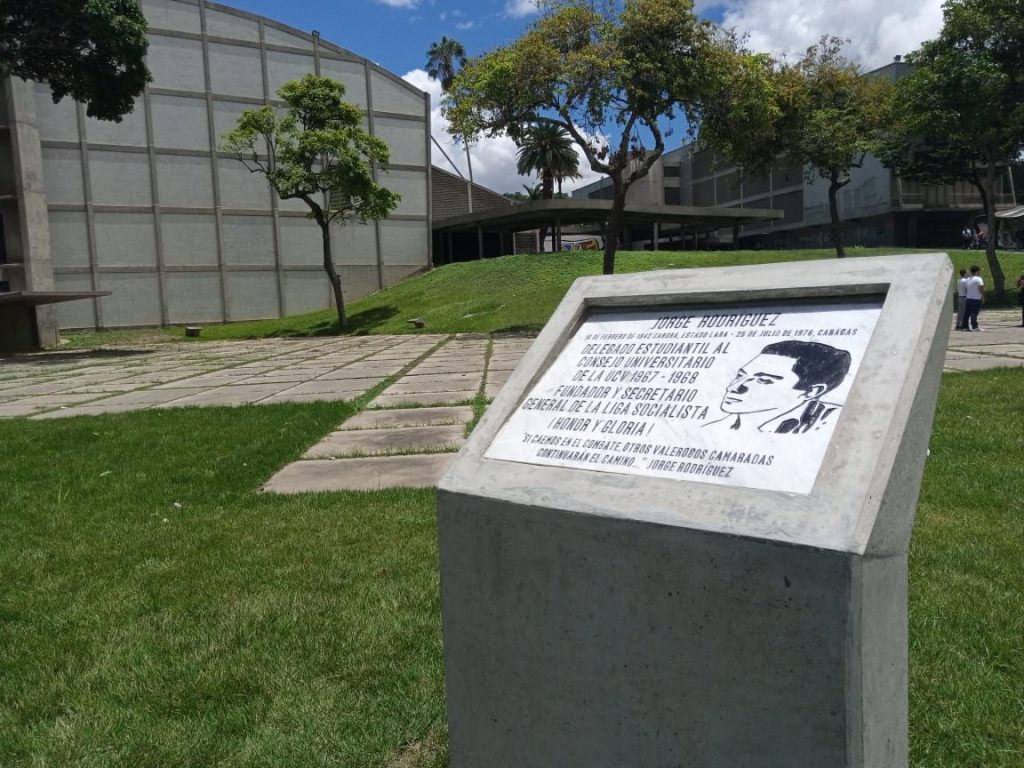
Also, some artistic changes have generated controversy. In 2022, the Rodríguez siblings installed a pedestal for a plaque of their father in the gardens. The same year, the sculpture of María Lionza made by the sculptor Alejandro Colina was removed without permission from the university authorities. The artwork was transferred to Yaracuy, where the Federation of Spiritualists thanked the Maduro government for the transfer. Similarly, the removal of all the paintings of the previous rectors from the rector’s office was reported. However, says a source from the rectory, the paintings were removed because an exhibition is being prepared in the university gallery for the public.
One model, two visions
Sectors critical of Rago’s management have denounced an alleged closeness to the government. A few days after the success of the opposition primaries in October 2023, in which Machado was elected as the opposition’s candidate, Nicolás Maduro organized in response the National Conference for Peace, Democracy and Dialogue “in order to defend the great interests of the country, to demand the lifting of all illegal, criminal sanctions.” In addition to Chavismo and representatives of non-unitary parties that proclaim themselves opposition, such as Alianza del Lápiz and Fuerza Vecinal, the conference included sectors that have recently softened their position towards Chavismo such as business guild Fedecámaras and the new authorities of the UCV.
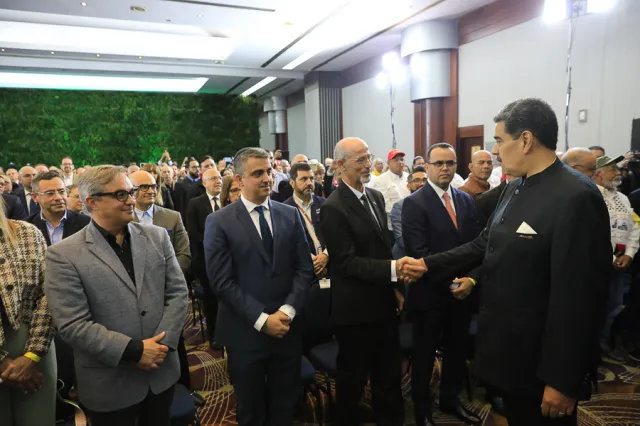
The relationship between the government and the UCV “has to be a purely institutional relationship and not be immersed in the national political diatribe,” says Rojas. “I believe that the presence of the rector at the Conference for Peace, which was evidently an act of political partiality with the intention of distorting citizens’ actions through their participation in the primaries, was not appropriate; it was a mistake.”
For others, the criticism is unwarranted. “We must build bridges and open dialogues with all sectors,” says Báez. “In the end, it was the presence of the rector of the oldest public university in the country –older than the Republic– in an event convened by the National Executive with the presence not only of the other public powers but also of civil society organizations. In a normal country that would not be strange. Here, it is part of the university’s re-institutionalization agenda carried out by the rector.”
But the Conference for Peace has not been the only political controversy of Rago’s administration. On May 11, during an internal soccer league match between the UCV FC team and Metropolitano FC, an inflatable Súper Bigote doll –the superhero version of Nicolás Maduro– was displayed at the University Stadium.
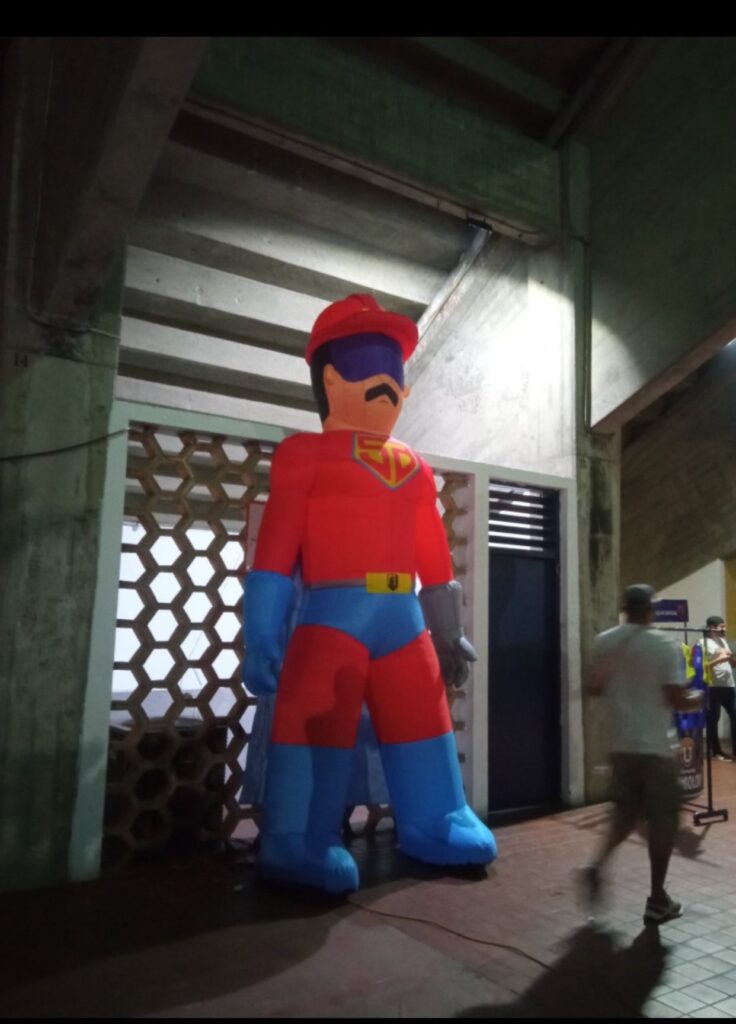
However, days later, the rectorate rejected the use of university spaces for political purposes and explained that the UCV FC team has “no relationship with the university that justifies its name and the use of institutional symbols.” However, they pointed out that “this team is one of the four professional soccer clubs that, in accordance with a contract signed several years ago and still in force, has the UCV Olympic Stadium as its headquarters.” However, for Rojas, incidents like these are “a sign of how spaces have progressively been taken over.”
The struggle of how –and who will– manage these spaces will define the destiny of the house that conquers the shadow. “The government and universities have the need and should have the common interest to talk, to dialogue, to agree on specific issues that concern the national interest,” Rago said in an interview for Prodavinci. “I do not believe that converting the university into an instrument of political struggle is the way out, the option for universities.”
Others differ. “The UCV is currently a laboratory for a model of governance and domination from the central power,” Uzcátegui says. “The so-called ‘curriculum transformation’ attempts to take it to the next level. And six more years of Chavismo in power will dynamite any glimmer of autonomy that remains.”
Caracas Chronicles is 100% reader-supported.
We’ve been able to hang on for 22 years in one of the craziest media landscapes in the world. We’ve seen different media outlets in Venezuela (and abroad) closing shop, something we’re looking to avoid at all costs. Your collaboration goes a long way in helping us weather the storm.
Donate


